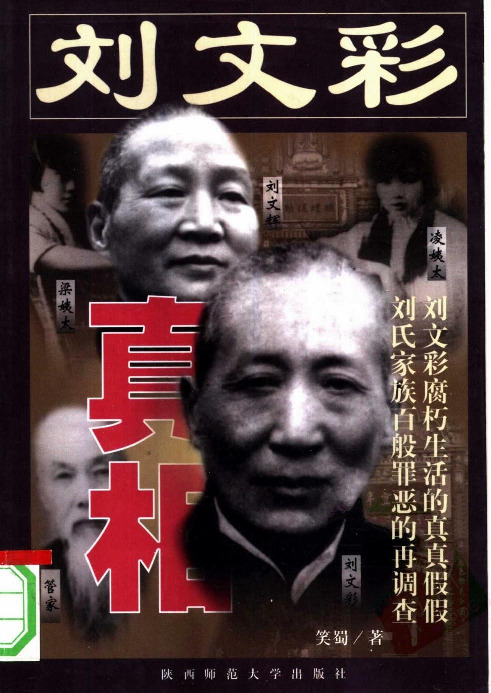Explore the collection
Showing 5 items in the collection
5 items
Book
Earthquake Insane Asylum
On May 12, 2008, when the Great Sichuan Earthquake struck, writer Liao Yiwu began to write "Chronicle of the Great Earthquake", which was serialized in <i>Democratic China</i> and reprinted on several Chinese websites. It had a wide impact. Liao went to Dujiangyan, Juyuan Township, Yingxiu and other earthquake-hit areas to conduct on-the-spot interviews. His travels and writings during the earthquake were reported and translated by many mainstream media.
In April 2009, Taiwan's Asian Culture Publishing published and distributed the traditional Chinese edition of <i>Earthquake Insane Asylum</i>, a pictorial and textual factual record that preserves the living conditions of the people during of the Sichuan earthquake.
Book
The Herald of History: The Solemn Promise of Half a Century Ago
Compiled by the Sichuan writer Xiao Shu (b. 1962), this book offers a variety of pro-democracy statements released by the Chinese Communist Party media, including short commentaries, speeches, editorials, and documents from <i>Xinhua Daily, Jiefang Daily, Party History Bulletin</i>, and <i>People's Daily</i> from 1941 to 1946. The essays criticize the Kuomintang government for running a "one-party dictatorship" and promised freedom, democracy and human rights.
The book was published by Shantou University Press in 1999. <a href="https://archive.ph/20220329191611/https://www.rfi.fr/tw/%E4%B8%AD%E5%9C%8B/20130817-%E9%A6%99%E6%B8%AF%E5%A4%A7%E5%AD%B8%E5%86%8D%E7%89%88%E3%80%8A%E6%AD%B7%E5%8F%B2%E7%9A%84%E5%85%88%E8%81%B2%E3%80%8B">According to Xiao Shu</a>, the book was heavily criticized by the then-head of the Propaganda Department, Ding Guangen. The publishing house was temporarily suspended, and copies of the book were destroyed. It was republished in Hong Kong by the Bosi Publishing Group in 2002, and reprinted by the Journalism and Media Studies Center of the University of Hong Kong in 2013.
Book
The Last Landowner (Record of Chinese Grievances Volume 3 - Book 1)
Land reform is one of the important events that affected the course of Chinese history in the twentieth century. Liao Yiwu spent two years on and off from the end of 2005 to complete <i>The Last Landlord</i>. The book comprises interviews with land reform survivors. As the author says, "Based on the degree of physical and mental weakening of the interviewees, I estimate that in another five or six years, the history of the land reform as orally told by those who witnessed it will be completely untraceable."
Book
Major Feminist Events in China 2020-2023
This is a record and index of major feminist events in China between 2020 and 2023. The document consists of more than 2,000 pages, in which 122 topics/events related to feminism have been curated. The document is divided into five chapters: “Feminism in the Public Eye ”, “Feminism in Individual Cases”, “Feminism in the Law”, “Feminist Activism,” and “Three Special Years - Feminism amid COVID-19”.
Each event entry is divided into two parts: event summary and related articles The first part aims to provide a complete and objective overview of the event, using first-hand materials when possible; the second part collects media reports and commentaries on the event published through public media outlets and social media platforms.
This document covers a wide range of topics/events, including but not limited to commercial surrogacy, gender discrimination in higher education, China’s population policy and the reproductive rights of women, misogynistic culture in the media, the progress and challenges of the #Metoo movement, legal analysis of law and policies concerning feminist issues, and feminist activism.
The editorial group introduced their intention as follows in the document’s introduction:
“This document, though imperfect, is an attempt to contribute to the writing of the history of Chinese feminism - history is the road we are walking at the moment, and we've come a long way, still searching for answers hidden in the thick fog. ”
“We hope that this document will not only serve as a tool, but also provide the reader with wisdom and strength.”
图书
The Truth about Liu Wencai
In the mid-20th century, Liu Wencai, a large landowner in Sichuan Province, spent almost all of his family's wealth in his later years on promoting education, bridge construction and road building, and was known as a great benefactor in the region. However, during the Great Leap Forward and the Cultural Revolution, he was portrayed as an archetype of evil landlords in the 3,000-year history of feudalism in China.
As the controller of great wealth in southern Sichuan during the Republic of China period, Liu Wencai did accumulate a huge fortune from plunder in his early years, but in his later years he invested most of it in public welfare. He financed and presided over the construction of a highway, as well as the Wanchengyan irrigation system, benefiting hundreds of thousands of farmers. He also spent almost all of his family's wealth to found the Wencai Middle School (today's Anren Middle School), which at the time was known as Sichuan's best privately-run school. In the memories of the local people, Liu Wencai collected less land rent than what was collected by the government after 1949. He was praised for providing financial assistance to poor families during special days and festivals, and for mediating civil disputes in a fair manner.
These facts were erased under the ultra-leftist propaganda. The authorities even fabricated the story of Liu Wencai keeping farmers in a dungeon filled with water, as well as making sculptures depicting how Liu Wencai was exploiting farmers, in order to incite hatred against him. This made Liu Wencai one of the most famous evil landlords in China.




